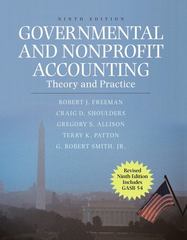Answered step by step
Verified Expert Solution
Question
1 Approved Answer
Manilow Corporation operates in an industry that has a high rate of bad debts. Before any year-end adjustments, the balance in Manilow's Accounts Receivable account
Manilow Corporation operates in an industry that has a high rate of bad debts. Before any year-end adjustments, the balance in Manilow's Accounts Receivable account was $611,500 and the Allowance for Doubtful Accounts had a credit balance of $40,000. The year-end balance reported in the balance sheet for Allowance for Doubtful Accounts will be based on the aging schedule shown below. Days Account Outstanding Amount Probability of Collection Less than 16 days $318,600 0.96 Between 16 and 30 days 119,200 0.92 Between 31 and 45 days 86,000 0.86 Between 46 and 60 days 42,600 0.82 Between 61 and 75 days 28,000 0.56 Over 75 days 17,100 00 *(a) What is the appropriate balance for Allowance for Doubtful Accounts at year-end? Balance for Allowance for Doubtful Accounts $ The Allowance for Doubtful Accounts should have a balance of $54,308 at year-end. The supporting calculations are shown below: Days Account Outstanding Amount Expected Percentage Uncollectible Estimated Uncollectible 015 days $318,600 0.04 $ 12,744 1630 days 119,200 0.08 9,536 3145 days 86,000 0.14 12,040 4660 days 42,600 0.18 7,668 6175 days 28,000 0.44 12,320 Balance for Allowance for Doubtful Accounts $54,308 The accounts which have been outstanding over 75 days ($17,100) and have zero probability of collection would be written off immediately by a debit to Allowance for Doubtful Accounts for $17,100 and a credit to Accounts Receivable for $17,100. It is not considered when determining the proper amount for the Allowance for Doubtful Accounts. *Exercise 7-4 Your accounts receivable clerk, Mary Herman, to whom you pay a salary of $2,055 per month, has just purchased a new Audi. You decided to test the accuracy of the accounts receivable balance of $160,290 as shown in the ledger. The following information is available for your first year in business. (1) Collections from customers $271,260 (2) Merchandise purchased 438,400 (3) Ending merchandise inventory 95,900 (4) Goods are marked to sell at 40% above cost Compute an estimate of the ending balance of accounts receivable from customers that should appear in the ledger and any apparent shortages. Assume that all sales are made on account. The ending balance of accounts receivable from customers $ Apparent shortage $ Computation of cost of goods sold: Merchandise purchased $438,400 Less: Ending inventory 95,900 Cost of goods sold $342,500 Selling price = 1.4(Cost of good sold) = 1.4($342,500) = $479,500 Sales on account $479,500 Less: Collections 271,260 Uncollected balance 208,240 Balance per ledger 160,290 Apparent shortage $47,950 1. Checking account balance $933,350; certificate of deposit $1,425,100; cash advance to subsidiary of $980,310; utility deposit paid to gas company $188. Cash balance $ 2. Checking account balance $504,120; an overdraft in special checking account at same bank as normal checking account of $21,100; cash held in a bond sinking fund $239,090; petty cash fund $399; coins and currency on hand $1,490. Cash balance $ 3. Checking account balance $597,260; postdated check from a customer $11,100; cash restricted due to maintaining compensating balance requirement of $112,840; certified check from customer $9,580; postage stamps on hand $696. Cash balance $ 4. Checking account balance at bank $45,850; money market balance at mutual fund (has checking privileges) $52,400; NSF check received from customer $824. Cash balance $ 5. Checking account balance $700,910; cash restricted for future plant expansion $500,900; short-term Treasury bills $187,200; cash advance received from customer $910 (not included in checking account balance); cash advance of $7,470 to company executive, payable on demand; refundable deposit of $30,900 paid to federal government to guarantee performance on construction contract. Cash balance $ 1. Cash balance of $933,350. Only the checking account balance should be reported as cash. The certificates of deposit of $1,425,100 should be reported as a temporary investment, the cash advance to subsidiary of $980,310 should be reported as a receivable, and the utility deposit of $188 should be identified as a receivable from the gas company. 2. Cash balance is $484,909 computed as follows: Checking account balance $504,120 Overdraft (21,100 ) Petty cash 399 Coin and currency 1,490 $484,909 Cash held in a bond sinking fund is restricted. Assuming that the bonds are noncurrent, the restricted cash is also reported as noncurrent. 3. Cash balance is $606,840 computed as follows: Checking account balance $597,260 Certified check from customer 9,580 $606,840 The postdated check of $11,100 should be reported as a receivable. Cash restricted due to compensating balance should be described in a note indicating the type of arrangement and amount. Postage stamps on hand are reported as part of office supplies inventory or prepaid expenses. 4. Cash balance is $98,250 computed as follows: Checking account balance $45,850 Money market mutual fund 52,400 $98,250 The NSF check received from customer should be reported as a receivable. 5. Cash balance is $701,820 computed as follows: Checking account balance $700,910 Cash advance received from customer 910 $701,820 Cash restricted for future plant expansion of $504,120 should be reported as a noncurrent asset. Short-term Treasury bills of $187,200 should be reported as a temporary investment. Cash advance received from customer of $910 should also be reported as a liability; cash advance of $7,470 to company executive should be reported as a receivable; refundable deposit of $30,900 paid to federal government should be reported as a receivable
Step by Step Solution
There are 3 Steps involved in it
Step: 1

Get Instant Access to Expert-Tailored Solutions
See step-by-step solutions with expert insights and AI powered tools for academic success
Step: 2

Step: 3

Ace Your Homework with AI
Get the answers you need in no time with our AI-driven, step-by-step assistance
Get Started


